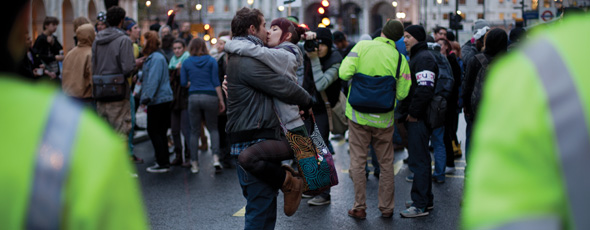
Every day millions of people struggle against the conditions capital imposes on society. People are confronted by economic and social injustice, environmental degradation, and the threat of war. Popular democracy appears when people begin to act together to organise protests, demonstrations, strikes, occupations, and revolutions. The appeal of democracy is universal because it offers the prospect of people governing themselves and determining their own future.
Capital and Democracy are fundamentally opposed. The power of money confronts the power of people. Should money or people rule the world? Capital concentrates more power in the hands of the minority. Democracy seeks to mobilise the power of the majority. Both are engaged in a protracted worldwide struggle for power, which will decide the future of humanity and the survival of the planet.
In the last twenty years the struggle for democracy swept across Russia and Eastern Europe, South Africa, Burma, China, Iran, Iraq, Kurdistan, and Palestine. Liberal or parliamentary democracy holds out the promise that the ‘will of the people’ will prevail and civil liberties will be secured. However, the experience of liberal democracy has shown that financial and corporate power continues to rule. Around the world people are increasingly disillusioned with liberal democracy because it cannot resolve the issues of economic injustice and sustainability.
Democracy’s opportunity
The Occupy movement was one of many responses to the crisis of capital. Spontaneous action caught the authorities off-guard, but now they have regained their composure and control. Consequently, Occupy faces a major decision regarding whether to convert itself into a more ‘permanent’ organisation with long term goals and strategies, or to accept defeat and move on to the next protest campaign.
We do not, however, have to invent a new strategy or aims. We need to understand the contradictions and alternative pathways within the movement itself. The future of Occupy is already there. Three objectives stand out: real democracy, economic and social justice, and a sustainable environment. It is not that they are opposed to each other. It is more a question of strategic priority, emphasis and linkage.
Movement – campaigns, parties and actions
Although the US movement began with economic focus on Wall Street, in ‘Scenes from Occupied America’, Rebecca Solnit identified the two issues at the centre of the movement – “economic justice and real democracy”. She says that by “living out that direct democracy every day through assemblies and committees”, the movement is “winning through people power”. New York Occupiers, like Marina Sitrin, urged people to take the real democracy route: “Soon, I hope, in our plazas and parks, our neighbourhoods, schools and workplaces, we will all be saying something similar: Real Democracy!”
Real Democracy is the means by which people power can implement economic and social justice, and a sustainable environment. Without it, the people can protest against injustice and ecological disaster, but like King Canute, we cannot stop the tide of capital lapping over us. Occupy has a future primarily as an international movement for real democracy. It has to win the argument that real democracy is the road to economic and social justice and a sustainable environment.
A movement is not a single organisation. The environmental movement, for example, has a range of parties, campaigns, think-tanks and direct action groups. There is the Green Party, the Alliance of Green Socialists, Greenpeace, Friends of the Earth, Climate Change, Climate Camp and more. The trade union movement remains the prime focus for struggles for economic and social justice. It has many organisations, publications, and campaigns gathered around it.
In contrast, there is no recognisable Real Democracy movement. Occupy should become the catalyst for a Real Democracy movement with a range of Real Democracy institutions, parties and think-tanks. Occupy should be the first organisation to take Real Democracy seriously, but eventually become one voice within a broader movement. We should not try to ‘own’ or control such a movement but play our part in building it.
By Steve Freeman








